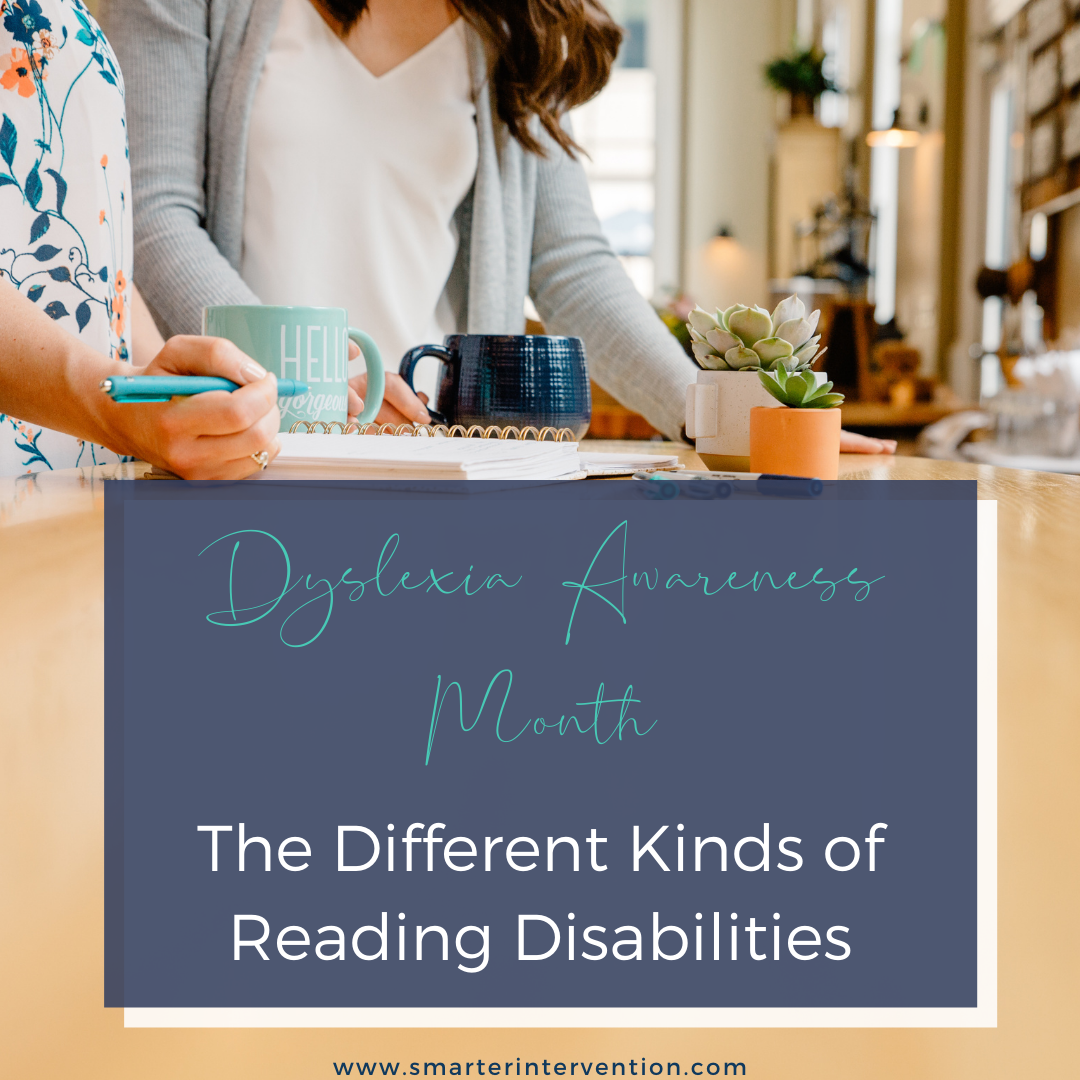Science-based literacy resources and articles
for families, educators and schools
Search by Category:
Categories
- Advocacy
- Business
- Comprehension
- Data Tracking
- Differentiation
- Dyslexia
- Evaluation and Assessment
- Executive Functioning
- Games & Activities
- Helping My Child At Home
- IEP/504 Plan
- Lesson Planning
- Math
- Online Intervention
- Organization
- Parents
- Phonics
- Phonological Awareness
- Reading Fluency
- Research
- SLP
- Spelling
- Vocabulary
- Writing
How to Use 1 Reading Activity to Target 5 Literacy Skills
There are so many different factors that play into learning to read and write effectively. It can often feel overwhelming because it seems like we need to hit on all of these skills separately and hope that it all comes together! This isn’t the case. With just one activity, you can hit on multiple skills and help your students grow!
Time Spent Testing My Students is Taking Away From Instruction Time (or is it?)
It can absolutely feel like all the time we spend evaluating could be better spent actually TEACHING our students the skills, right?
But the truth is - it is a critical component of our instruction.
While we are just as eager to jump into concepts with our students and get them the instruction we KNOW they will need, we have to recognize that assessments and data should be providing us incredibly valuable information that sets the trajectory for where we need to go.
The One Thing You Can't Leave Out in Reading Intervention
We’ve been at this for a while now! We’ve worked with hundreds of struggling students in a variety of different settings and one of the most important things we’ve learned is that students DO NOT struggle with reading for the same reasons!
And this is SO important to recognize, because if we don’t recognize this, then we try to support struggling readers using all the same strategies, and the bottom line is that just doesn’t work. For many reasons, but most importantly because in order to support ALL struggling readers, we need to know WHY they’re struggling to read!
Should We Be Using Decodable or Non-controlled Texts For Our Fluency and Comprehension Instruction?
When we think about reading instruction, there are a few different style texts that we can use to support fluency and comprehension. Often, we hear about things like decodable texts, predictable readers, controlled vocabulary readers, language experience stories, authentic literature, and noncontrolled texts.
With so many different styles, it can be challenging to know which to use when. There are champions for many different styles and you may have heard pros and cons for one style versus another. Today, we are going to take a look at two of the styles we hear about most often - decodable vs. non-controlled text.
This Should be Fueling Your Literacy Instruction
When we think about our literacy intervention - we can compare it to driving a car. We know that in order to get to our final destination (in this case that is getting students to grade level), we need gas or some sort of fuel. Keep reading to learn about what part of your literacy intervention is the fuel that will allow you to get to your final destination.
The 3-Step Framework that Will Drive Your Intervention to Better Results
Over the last few weeks we have been talking about how there are many students who are reading below grade level, even after years of intervention. This week, we will be talking about an easy 3-phase approach to intervention that will allow all of us to change trajectories for students like this so that they can FINALLY get back to grade-level faster than ever before.
Why Some Students Are NOT Responding to Intervention
These students, like so many others, have continued to fall behind year after year. Often, they take on the label “non-responders” but this doesn’t have to be the case. Keep reading to learn more about why this student has continued to struggle year after year and how we can change the trajectory for students like her.
Why Tier 3 Students Continue to Struggle
Our Tier 3 students are those who are considered to be significantly below grade level. These children are those that are identified and receive IEP services and support. Even with these supports, however, many students continue to struggle. Keep reading to learn why.
Where Do Students Need Explicit Instruction?
Students struggle for different reasons and in different capacities. In order to truly support our struggling readers, we must not only understand why students are struggling but also -
Where are students struggling to read specifically?
Which specific areas are causing students to be ineffective readers? Because the bottom line is if we are trying to support struggling readers, we need to stop applying one-size-fits-all approaches and we need to know what type of support is needed to get our struggling readers on track. Keep reading to learn more!
How Data-Tracking Makes Classrooms Equitable
As educators we are capable of changing the world - one of the best ways we can continue doing this is by leveling the playing field for our students, so every child can be as successful as they can be. In order to level the playing field, we must have clarity around our students’ strengths and difficulties and we must make sure that we’re able to understand this in an equitable way. Educational equity is absolutely crucial because it gives equal opportunities to children. Data-tracking can help set us up for educational equity - keep reading to learn more about educational equity and how data-tracking can help us make our classrooms more equitable for all of our students.
The Wrong Ways to Use Data
When we are trying to determine which areas we should focus on with our students we are using our data to provide a guide, a roadmap.
But one of the biggest mistakes we see (we know because we’ve been there) is that we aren’t using data to drive decisions because of two big blocks.
The Common Literacy Intervention Belief that Could Be Holding You Back!
Assuming a program, even an evidence-based program, works for all students without tracking your own data and adjusting as needed, puts students at risk to continue falling through the cracks. Click the image above to read more about a common belief that may be holding you back in your intervention.
How to Track Literacy Data Digitally
While 2020 was an interesting year to say the least, we were glad to have learned so many lessons. One of which, was how to stay organized in a completely digital space. We transitioned lessons to a completely digital format, student interaction, you name it! And with all the changes, we realized Tracking data digitally was another great way to communicate students’ growth and what was happening in our sessions with our students’ parents and with our colleagues. Today, we wanted to walk you through how we track our literacy data in a digital format!
The Missing Piece in the Data-Tracking Process
One of the biggest mistakes we see in intervention is when interventionists take all of this time to collect wonderful data, but then not effectively sharing it with those who have a vested interest in the results - click here to read more about how you can EASILY share your results and grab a FREE resource that will help you do so!
How to Analyze your Literacy Intervention Data
We are back again with the next step in Data Tracking! This week we are talking all about analyzing your data. Now, we know that the word analyze brings about a heavy weight - but hear us out. Analyzing your data doesn’t have to be hard. One of the biggest mistakes we see is when well-meaning interventionists and SLPs rely on evidence/research based programs without analyzing their own data to make sure that students are actually making growth.
How To Collect Reading Intervention Data
It’s Data-Tracking December! All month long we will have blogs and video trainings for you related to the 4 biggest mistakes we’ve made in data-tracking. If you are looking for a way to better track your intervention data or you’re hoping to understand how to use that information more effectively to drive your instruction, then stay tuned because these next four weeks will deliver exactly what you are looking for.
The Different Kinds of Reading Disabilities
Many students struggle to learn how to read effectively or efficiently.
RESEARCH INDICATES THAT THERE ARE THREE DIFFERENT TYPES OF READING DISABILITIES.
These three types of disabilities relate to (if you know us…you’re probably guessing it right now!!!)
YEP…..
The Literacy Processing Triangle
Why We Must Track Data Effectively in Literacy Intervention
Today we’re jumping right into one of our favorite things to talk about!
Literacy Intervention Data!!!
We’re fun at parties (well at least back when there used to be parties), trust us…
We know that diagnostic prescriptive instruction following a systematic and structured approach is the most effective way to get students to grade-level and beyond, but how exactly can we provide truly diagnostic and prescriptive instruction?

















